Your body needs vitamin E to fight infections, maintain healthy skin and cardiovascular function, and improve your vision. Read more to find the best vitamin E supplements for 2024.
Vitamin E is one of the best supplements you can take. It’s important for healthy skin, hair, nails, and proper vision. It also protects against free radicals that cause oxidative stress and accelerate aging. This makes it especially useful for those who want to look younger or live longer!
What is Vitamin E?
Vitamin E is a fat-soluble vitamin that helps protect the body from free radicals. Free radicals are produced naturally during metabolism, but environmental factors like smoke and pollution can also produce them. Vitamin E works as an antioxidant, which helps neutralize free radicals in the body and prevent damage caused by them.
Vitamin E is necessary for maintaining healthy skin, hair, and nails. It’s also essential for proper brain function and development, especially in children. In addition to being a powerful antioxidant, Vitamin E has been shown to have other health benefits as well, including:
- Preventing blood clots
- Reducing the risk of heart disease or stroke
Taking vitamin E supplements can be a simple way to improve your overall health.
There are many types of vitamin E supplements available. However, these five options are considered the best by experts:
The 10 Best Vitamin E Supplements of 2024
1. Garden of Life Vitamin Code “Raw Vitamin E”
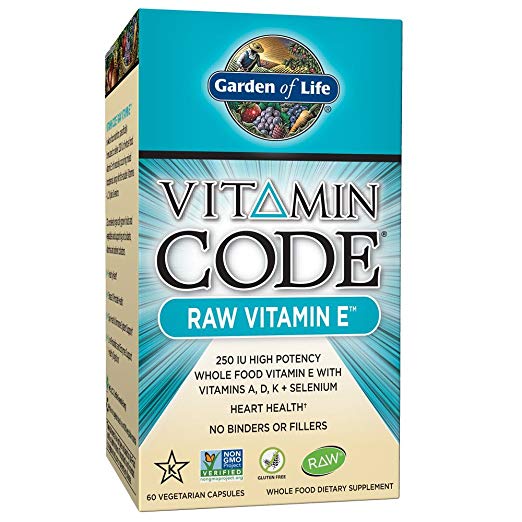
There is a huge gap between the observed health effects of people who consume a diet rich in natural sources of alpha-tocopherol (vitamin E) and the results of most clinical studies of synthetic forms of vitamin E.
Another potential explanation for the difference could be other phytonutrients found in natural foods that are rich sources of vitamin E.
The Garden of Life is a potential way to overcome the limitations of conventional vitamins and minerals. It includes 125 international units (IUs) of natural plant-based antioxidants, plus probiotics and digestive enzymes to help improve absorption.
Suppose you’re looking to take a single dose of isolated (or “pure”) alpha-tocopherol. If that’s the case, Garden of Life is a good choice for a well-dosed mix of vitamins and minerals, although it’s not the best option.
2. Solgar Vitamin E
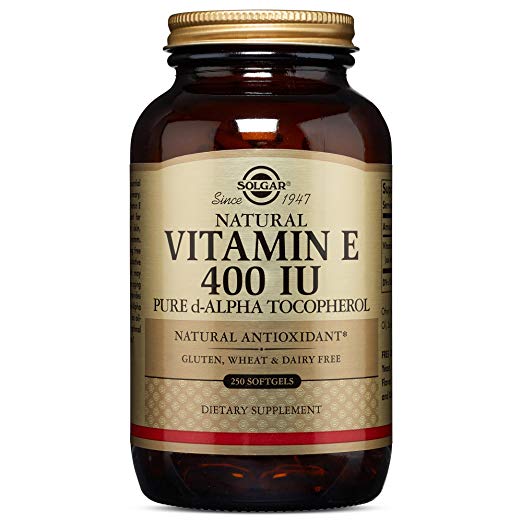
Solgar Vitamin E contains pure vitamin E (alpha-tocopheryl acetate) dissolved in a mixture of vegetable oils.
The capsule is made of gelatin, a natural substance derived from animal bones. Aside from the fact that it contains some form of protein, it doesn’t contain any other allergens.
It has 400 IU of vitamin E per capsule, making it a good option for those seeking their daily dose of vitamin E. who want to take their daily dose of vitamin E.
3. Amazon Elements Vitamin E
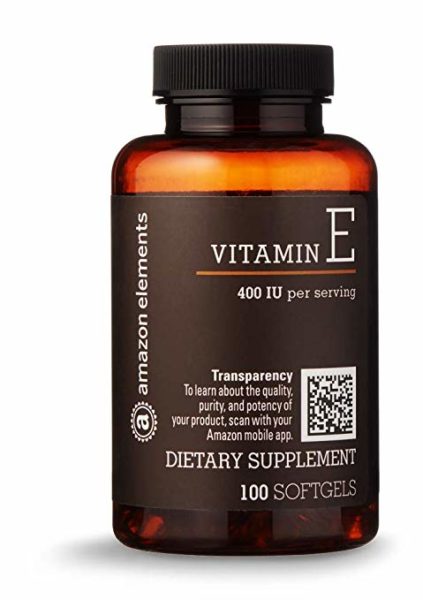
Amazon Elements Vitamin E contains 400 International Units (IUs) of vitamin E per serving. It is made from natural sources and is suitable for vegetarians.
If you’re not concerned by the presence of soy, then go ahead and choose it. However, you may want to look elsewhere if you’re a vegetarian or vegan.
4. Pure Encapsulations: Vitamin E
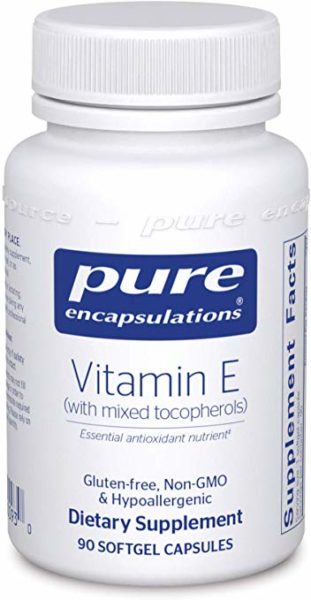
Pure Encapsulations’ Vitamin E contains a mixture of tocopherols for its 400 IU dose of vitamin E, encapsulated in a gelatin shell and dissolved in a blend of rapeseed and sunflower oils.
“Bioavailable” means that the body can use these nutrients effectively. Therefore, this vitamin E supplement is a good choice for people who want to take advantage of its benefits.
5. Eden’s Semilla Vitamin E Oil
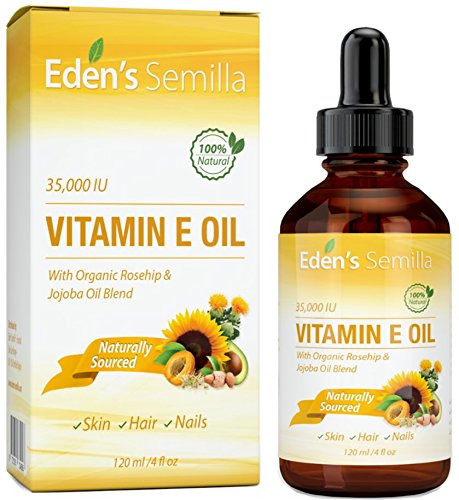
Eden’s semilla® Vitamin E Oil is a great option for treating scars and wrinkles. It contains a combination of vegetable oils, including sunflower, sweet almond, apricot, and jojoba oil.
These oils are used as carrier oils for topical treatments that can be absorbed through the skin, fingernails, or scalp. They’re made from natural ingredients, so they’re an attractive option as a topically administered vitamin E product.
6. NusaPure Vitamin E
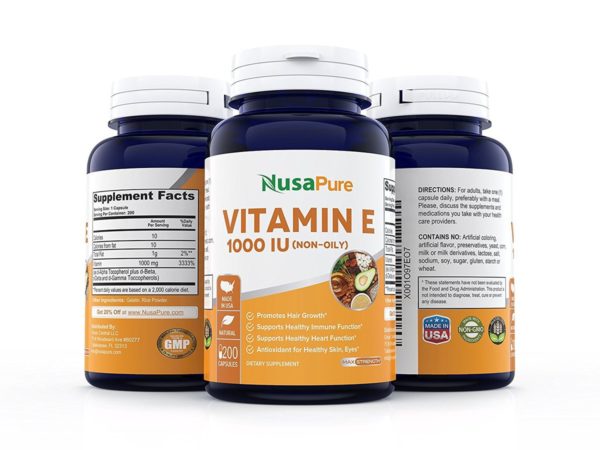
If you’re intent on megadosing vitamins C and E, then Nusapure is the best choice. Each bottle contains 1000 IU of vitamins C and E, delivered as mixed tocopherols in a gelatin caplet.
The bioavailability of vitamin E may be reduced slightly by the absence of a high quality vegetable oil. Still, this small reduction is easily compensated for by the very large doses in each tablet.
7. Deva Vegan Vitamin E
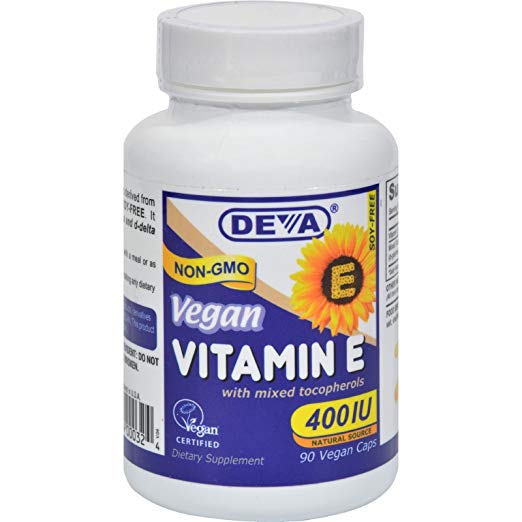
Deva® Vegetarian Alpha Tocophel Succinate (400 IU) is a vegetarian-friendly form of alpha tocophel succinate. Unlike other vegetarian-friendly forms of tocopheryl succinate, it dissolves into an oil base rather than a water base, which means it has better bioavailability than most other vegetarian-friendly forms.
8. NOW Foods Natural E-400
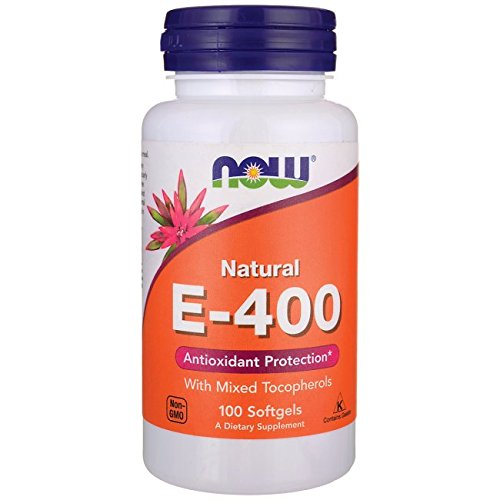
Now Foods E-400 uses a mixture of different tocotrienols to deliver its 400 IU dose. The capsule is gelatin-based, and although it uses a low-grade type of olive or sunflower seed oil as a solvent for the Vitamin E, it isn’t a high-grade type of olive or sunflower seed oil like some of the other products on the market.
Now Foods Vitamin E is a good choice for people with a low dietary intake of vitamin E. If you eat healthily but are still concerned about getting enough vitamin E in your diet, NOW Foods Vitamin E may be an excellent choice. It’s also a good option if you’re looking for a high-potency vitamin E supplement.
Now Foods Vitamin E has more than double the amount of active ingredients (tocopherol) compared to other brands on the market and has been shown in studies to increase HDL cholesterol levels and reduce LDL cholesterol levels in users over six months. In addition to its benefits as an antioxidant and potential aid against heart disease, it also assists with muscle fatigue.
9. Health Priorities Vitamin E Enhance
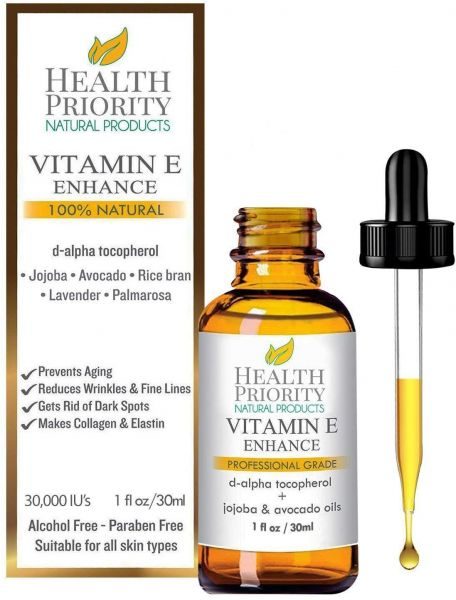
Health Priority’s Vitamin E Enhancer is a liquid vitamin E product designed for skin, nail, and scalp health. It has an oil-based system to give a strong dose of vitamin E, along with herbs like lavender and palmarosa.
Some people may want to use these extra plant extracts, but they can cause an allergic reaction if you have sensitive skin. It might not be the best choice for you.
10. Kirkland Signature Vitamin E
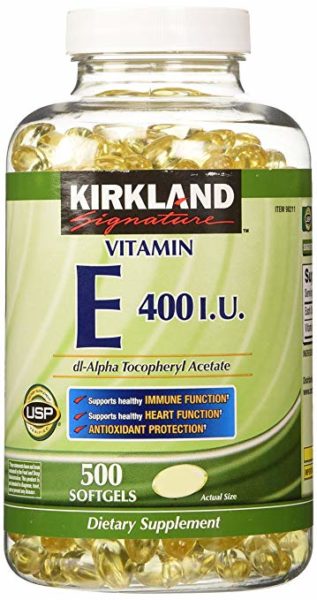
Kirkland Signature is known for its simple and effective supplements, making it a great choice for those who want something easy to use. However, their effectiveness is somewhat diminished because they’re so simple.
It contains 400 IU of vitamin E inside gelatine-based softgels. Unlike other competitors, it doesn’t use natural vegetable oils as solvents for their vitamin E.
Vitamin E is a fat-soluble nutrient, which may be less bioavailable than other options. However, since it effectively reduces inflammation, it may still be worth trying.
The health benefits of vitamin E
Vitamin E is an essential nutrient that your body needs to function properly. It plays an important role in maintaining good health and preventing diseases.
Protects against aging.
Vitamin E mainly works as an antioxidant to protect your body from harm caused by free radicals. Free radicals can form from daily activities such as exercising or consuming certain foods, as well as from other sources like pollution and smoking. The more free radicals you have in your body, the faster you age.
Vitamin E can be found in many different types of food, including vegetable oils like sunflower oil and soybean oil; nuts like almonds and peanuts; seeds such as pumpkin seeds; avocados; green leafy vegetables like spinach; whole grains such as oats or brown rice; and eggs (if they’re organically raised). You can find vitamin E supplements at the grocery store if you don’t have time to cook every day or want something quick. Not all supplements have the same amount of nutrients. Choose a brand that states its serving size contains at least 30% DV for phytosterols. Otherwise, your health might suffer!
Prevents cancer
Cancer is a serious disease, and it’s not just for humans. If your pet is diagnosed with cancer, you may be concerned about her condition and how to help her through it. Vitamin E has been shown to prevent animal cancer development and reduce their risk of cancerous cells.
Vitamin E prevents cell damage by free radicals, which are molecules that can cause cell dysfunction or death. Vitamin E reduces cellular stress and makes it harder for damage caused by free radicals to lead to diseases like cancer.
It improves heart health.
The antioxidant vitamin E is found in many foods, including nuts and seeds. It can also be used as a supplement to decrease the risk of heart disease by protecting your blood vessels from damage caused by free radicals.
Vitamin E is an antioxidant that helps protect cells from environmental damage caused by free radicals, along with vitamin C and beta-carotene. Free radicals are harmful chemicals in our bodies that can damage cells if not neutralized by antioxidants like vitamin E. Over time, this can lead to chronic inflammation and increase the risk of heart disease, especially during oxidative stress caused by exercise or prolonged sun exposure.
It defends against degenerative eye conditions.
It’s not surprising that vitamins are good for your eyes. After all, they’re packed with nutrients that can help you see better and feel healthier. But did you know that vitamin E is instrumental in protecting the eyes from degenerative conditions?
Vitamin E is an antioxidant, which protects cells from damage caused by free radicals. These molecules are created when your body breaks down food or gets hit with environmental toxins (like cigarette smoke). Free radicals attack healthy cells, causing inflammation and other health problems over time.
Antioxidants are important for our health. They help protect our cells from harmful free radicals. We need antioxidants like vitamin E in our diets to protect sensitive parts of our body, like our eyes.
supports the immune system.
Vitamin E is a powerful antioxidant that protects the immune system from free radicals. Free radicals are biological molecules that are unstable, highly reactive, and can cause damage to cells. This can lead to inflammation and other problems in the body. Antioxidants neutralize these harmful byproducts, so vitamin E is an important nutrient for supporting your immune system.
Vitamin E can defend against a wide range of diseases.
Vitamin E has been found to protect against a wide range of diseases, including cardiovascular disease, cancer, and eye diseases.
It is an antioxidant. Antioxidants perform several bodily roles, but the most important is preventing oxidative damage in your cells. Oxidative damage occurs when too many free radicals (unstable molecules with unpaired electrons) float around. Free radicals are harmful because they can react with other molecules and damage DNA or other parts of cells, leading to inflammation and disease. Antioxidants help by stopping free radicals before they cause harm, and vitamin E is one of the best at doing this!
Side effects of vitamin E
The side effects of vitamin E are mild in some people, but they can be serious in others. This article will discuss the causes and symptoms of vitamin E side effects, as well as provide steps to minimize them.
Vitamin E side effects are usually mild, but they can be serious in some cases.
Some vitamin E side effects can be quite serious, though they’re rare.
- Headaches
- Fatigue
- Nausea and diarrhea
- Skin rashes
- Abdominal cramps and pain
Headaches
Vitamin E can cause headaches when you take too much of it. This is rare, but it does happen. The National Institutes of Health recommends 400 international units (IU) per day as the upper limit for vitamin E consumption. When you take too much vitamin E, your body absorbs and stores it in fat cells. Excess vitamin E can harm red blood cells and platelets, leading to anemia or bleeding issues.
Other health problems like infection, dehydration, or stress could be causing your headache, not necessarily the vitamin E supplement.
Fatigue
One of the most common side effects of vitamin E is fatigue. If you find your energy levels dropping, it’s best to speak with your doctor about whether or not your vitamin E supplement could cause this before discontinuing it entirely.
To avoid fatigue in the future, try taking smaller doses over a longer period instead of one large dose at once. You can switch between different types of vitamin E, like alpha-tocopherol and gamma-tocopherol, to see if one causes less fatigue for you.
Nausea and diarrhea
When taken in large doses, vitamin E can cause nausea and diarrhea. Vitamin E builds up in the body over time because it is a fat-soluble vitamin. This can result in side effects such as indigestion if you take too much at once.
Vitamin E, as an antioxidant, can help fight free radicals that harm cells. Taking the right amount of vitamin E can be good for your health, but taking too much can be bad.
Skin rashes
The side effects of vitamin E can include skin rashes. The rash is usually mild and will go away on its own, but it may be a sign of a more serious problem. You could have an allergic reaction to vitamin E or have taken too much of it (hypervitaminosis).
Abdominal cramps and pain
- Abdominal cramps and pain can be caused by increased bile flow. Bile is a fluid made by your liver that helps digest fats, dissolve fat-soluble vitamins, and remove excess water from the body. Vitamin E can thin the blood and increase bile flow, but it’s unlikely that you would get injections of it.
- Painful abdominal cramps are also associated with vitamin E’s ability to thin the blood. Vitamin E is a type of fat-soluble vitamin that can cause bloating and abdominal cramping by speeding up the absorption of fats in your body and slowing down their elimination. Contact a doctor immediately if you experience this for more than two days after starting high-dose vitamin E treatment. It could mean liver damage from excessive intake without sufficient magnesium levels to balance the effects. This is especially important when treating long-term conditions like cancerous tumors, which need daily doses for months.
Symptoms of Vitamin E Deficiency
Symptoms of Vitamin E Deficiency:
If you’re not getting enough vitamin E, you might be experiencing some of these symptoms:
-Dry skin
-Frequent infections, including colds and flu
-A weakened immune system
-Achy joints and muscles
-Muscle cramps
-Poor eyesight
Who Should Buy Vitamin E?
Vitamin E is worth considering if you’ve been looking for a way to improve your health and overall well-being. Here are some groups of people who should consider buying vitamin E supplements:
1) People with heart disease or high cholesterol
People with diabetes
3) People who are at risk of cancer
4) Anyone with a compromised immune system (e.g., people who are immunocompromised due to illness or medication use)
Recommended dosage of vitamin E
There is no recommended daily allowance for vitamin E for healthy people.
Your doctor will tell you how much to take if you’re taking vitamin E to help prevent or treat a disease.
It’s best not to take more than the recommended daily amount of vitamin or mineral. Too much can be harmful.
If you take too much, contact your doctor immediately.
For people with heart disease and high blood pressure, 400 IU daily is usually recommended.
If you have heart disease and high blood pressure, the typical daily dose of vitamin E is 400 IU. This is best taken in pill or capsule form, since it’s hard to get enough from food alone if you eat a balanced diet. Vitamin E is generally safe, but too much may cause side effects.
It’s important to talk to your doctor before taking any supplements or medications because they could interact with your current health condition.
Higher doses of vitamin E may be beneficial for individuals with diabetes and Alzheimer’s. The recommended daily dose of vitamin E for people with diabetes is 10 mg.
For people with diabetes, the recommended dose of vitamin E is 10 mg per day. This amount may help protect against diabetes, and it’s safe to take without a doctor’s supervision.
People with Alzheimer’s should get vitamin E in 100 mg to 400 IU daily (the recommended daily dose for adults). However, higher doses have been shown to improve memory and thinking skills in some people. Higher doses can be dangerous if you take blood thinners or other medications that affect fat absorption from food.
Speak to your doctor before starting a vitamin E supplement.
Speak to your doctor before starting a vitamin E supplement. Vitamin E is fat soluble, so it can build up in your body. Excessive vitamin E can be harmful, especially for individuals with high cholesterol or triglyceride levels in their blood (hyperlipidemia).
Vitamin E supplements may interact with certain medications, such as statins to lower cholesterol and birth control pills. These interactions can increase the risk of side effects associated with these medications.
Ask your doctor about taking vitamin E with blood thinners like warfarin. Keep in mind that most doctors advise against combining these two due to the potential risks involved.
FAQs about the best Vitamin E
What is Vitamin E?
Vitamin E is an antioxidant that helps protect your cells by neutralizing free radicals. Free radicals are unstable molecules that can damage cells and cause inflammation—and they’re made when you exercise or drink alcohol.
How Much Do You Need Each Day?
Women over 19 years and men over 70 should consume 15 milligrams (mg) of vitamin E daily. Women under 19 years old should get 11 mg daily, and men under 70 should get 15 mg daily. If you are pregnant or breastfeeding, ask your doctor about the appropriate daily dosage of vitamin E as it may vary from what is recommended for adults who are not pregnant or breastfeeding.
Where do I get the most vitamin E?
Vitamin E is found in seeds (such as sunflower or pumpkin), nuts (like almonds), vegetable oils (like soybean or canola oil), and some fruits (like avocados). You’ll also get vitamin E from leafy greens like spinach or kale.
When should I take vitamin E, morning or night?
Vitamin E can be taken either in the morning or at night. The best time to take it is before bedtime.
What foods contain the most vitamin E?
Vitamin E is found in nuts, seeds, leafy green vegetables, whole grains, fish, and vegetable oils.
Which brand of vitamin e capsule is best for your face?
Vitamin E capsules are great for skin care. They contain antioxidants that help prevent damage from free radicals.
As a veteran fitness technology innovator and the founder of GearUpToFit.com, Alex Papaioannou stands at the intersection of health science and artificial intelligence. With over a decade of specialized experience in digital wellness solutions, he’s transforming how people approach their fitness journey through data-driven methodologies.
